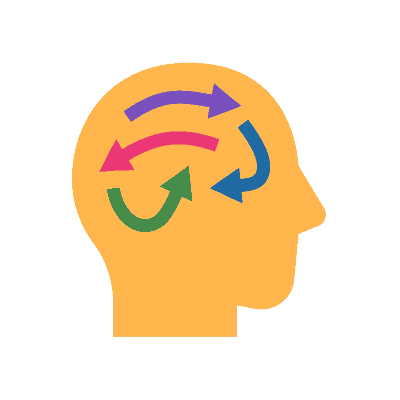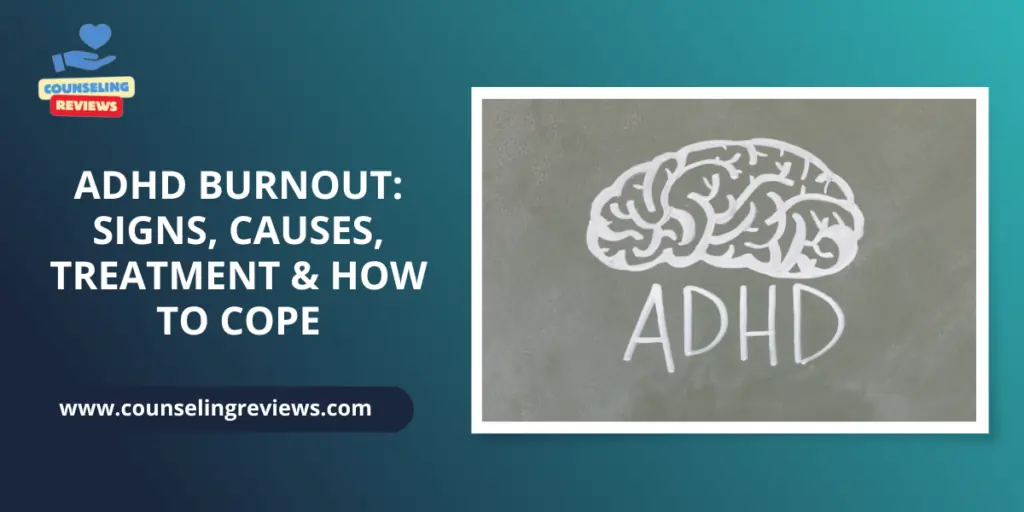Children and adolescents who have ADHD often experience low self-esteem, behavioral issues, and an inability to form meaningful relationships (because of how they are perceived by others, and not because they are unable to). Unfortunately, ADHD is often underdiagnosed and is not detected until these youngsters attain adulthood.
People with ADHD tend to experience symptoms similar to burnout. Hence, in this article, we attempt to distinguish ADHD from burnout and understand how people with ADHD experience burnout.
What is ADHD?
Attention-deficit/hyperactivity disorder (ADHD) is a diagnosable condition that often begins during childhood. The disorder is characterized by poor performance at school, inability to pay or sustain attention, hyperactivity, and a propensity to engage in impulsive behavior.

When ADHD is diagnosed during adulthood, it is known as adult ADHD. Treatment for both childhood ADHD and adult ADHD are the same and includes therapy and medicines.
What Is Burnout?
Burnout can be described as an extreme form of “being stressed out”. However, the Cleveland Clinic states that “burnout” is not a medical condition but a combination of physical, mental, and emotional exhaustion that causes poor performance at work, irritability, low moods, and loss of motivation.

This may seem like depression, and many times, burnout may mimic major depressive disorder. However, people who feel burned out recuperate quickly if they get enough rest and breaks. Therapy, exercise, and time away from work can help reduce feelings of burnout.
What Is ADHD Burnout?
ADHD burnout is not a specific form of burnout or a subtype of ADHD. Instead, people with ADHD may experience burnout due to doing too many things at once, expending cognitive resources at a higher rate than others, and being disorganized in life in general.
It is important to remember that people with ADHD have difficulty paying attention, and they do not always manage their time very well. This leads to missed deadlines, loss of productivity, and pressure to finish things on time. This can paradoxically lead to burnout simply because ADHD interferes with life.
While some insist that ADHD burnout is a specific kind of burnout, others insist that it is just regular burnout, but with an ADHD comorbidity. Regardless of what we choose to call it, people with ADHD seem to be at a greater risk of being burned out, and burnout can exacerbate symptoms of ADHD. In other words, ADHD burnout is a vicious cycle from which one needs to break.
What Are the Signs and Triggers of ADHD Burnout
People with ADHD find it difficult to manage their time, tend to be disorganized, and have difficulty paying attention. They are also hyperactive and tend to take up more than they can handle. Keeping these things in mind, here are the signs and triggers of ADHD burnout.
- Loss of motivation – People with ADHD may notice they are losing motivation in things they usually enjoy doing. This could be due to exhaustion stemming from taking up too many things simultaneously.
- Irritability – When you are burned out, you tend to feel irritable and annoyed at the slightest of inconveniences. This is also true of people with ADHD, who sometimes get irritable when things don’t go their way. As a result, not performing well at work or school, being nagged at home, or being in a relationship can all cause a person with ADHD to feel overwhelmed and irritable.
- Exhaustion – The hallmark symptom of being burned out is being exhausted physically and mentally. A person with ADHD may get exhausted quickly if he or she takes up more tasks than they can handle. Hyperactivity, which is a symptom of ADHD, can also trigger the individual to take up more than he or she can handle, leading to exhaustion.
- Physical symptoms – Many people experience indigestion, headaches, fatigue, and other physical symptoms when they are burned out. People with ADHD may experience these symptoms, too.
- Negative self-perception – Being burned out makes one feel worthless and incapable of doing things. If you are mentally and physically exhausted, you can’t perform as you usually do, can you? People with ADHD experience low self-image anyway, and being burned out can exacerbate it.
What Causes ADHD Burnout
As explained previously, ADHD burnout is not a diagnosis by itself. Instead, people with ADHD may experience burnout like anyone else when they are overwhelmed or stressed out. As ADHD causes one to be hyperactive and impulsive, the individual may end up doing too many things at once, resulting in burnout.
In addition, expending physical and cognitive resources due to hyperactivity can also lead to burnout. In short, most symptoms of ADHD put an individual at risk of being burned out.
How to Cope with ADHD Burnout – Tips to Manage Burnout
Coping with ADHD burnout is similar to how you should cope with regular burnout. However, what sets people with ADHD and burnout at the same time is that they also have ADHD. This means, in addition to the following tips, you must also seek psychological care and psychiatric medicines. We will touch upon this in the next section.
- Exercise – Get enough physical activity, at least 30 minutes daily, five days a week.
- Meditation – If this works for you, try practicing meditation. Only some people like it, though.
- Mindfulness – Mindfulness encourages you to observe your thoughts and feelings non-judgmentally and is known to reduce symptoms of burnout.
- Frequent breaks – Take regular breaks from work, relationships, and life. A vacation on a weekend all by yourself is a great idea!
- Socializing – Make sure to meet with people who energize you. Humor, socializing, and banter will help reduce stress levels.
- Self-care – Remember to get enough sleep, eat well, and keep yourself hydrated. In addition, practice self-soothing activities as well.
Recovering from ADHD Burnout – Therapy Options
As you can see, ADHD is a severe psychological condition for which you need both therapy and medicines. The signs and symptoms of ADHD may also put you at a greater risk of burning out quickly. Thankfully, being in treatment and continuing to work with your thoughts and behaviors can help reduce the distress associated with both ADHD and burnout.
Some of the evidence-based therapy options include cognitive behavior therapy (CBT), behavior therapy and behavior management (BT and BM), acceptance and commitment therapy (ACT), and an eclectic approach that combines different therapeutic models to help you cope with both ADHD and burnout.
With time, effort, and consistent offline or online therapy, you will notice that you’re able to manage symptoms of both ADHD and burnout better.





